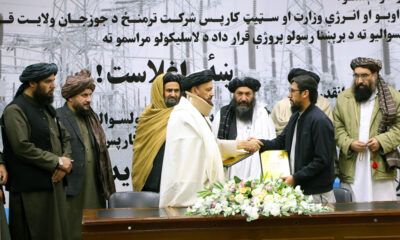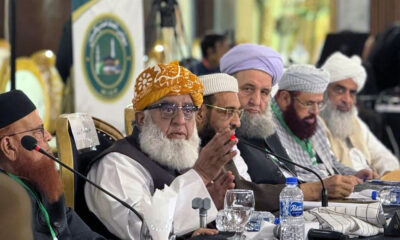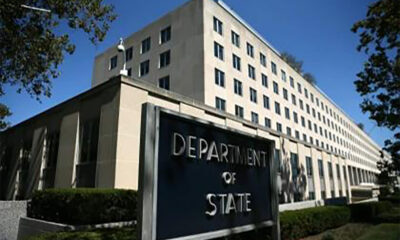Latest News
‘Desperate situation’ for Ghani as his power is undermined: NYT
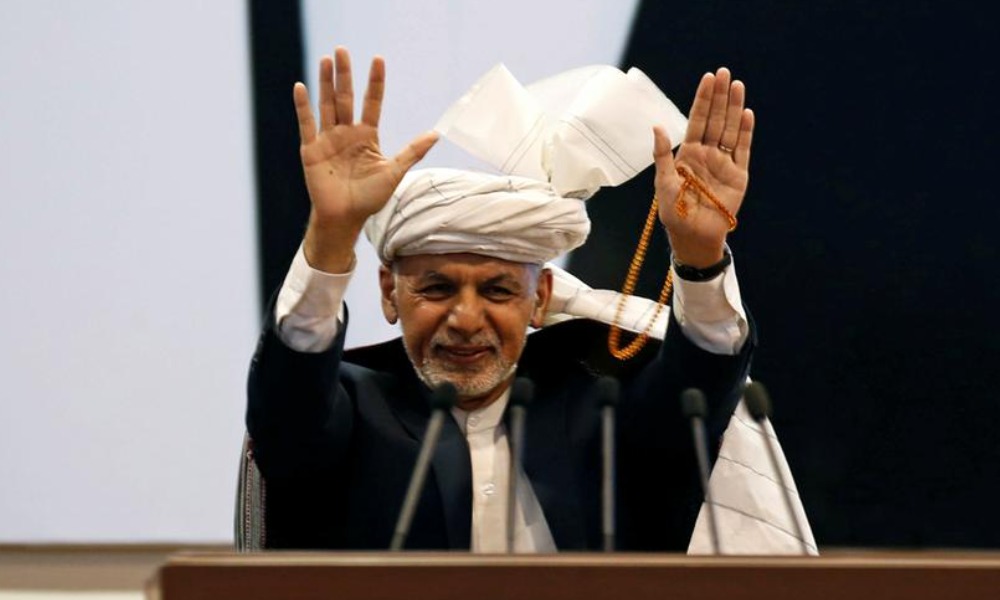
A senior Afghan military official said this week that if the US pulls out without a political settlement having been reached between government and the Taliban, the country will be in “deep trouble”.
Speaking to the New York Times this week, the security official said: “If the US pulls out, and there is no political agreement, then we are in deep trouble.”
“Militarily, we don’t have much hope,” he said. “If we don’t get something, the Taliban are going to march. It’s going to be a severe battle.”
One Western diplomat in Kabul said the country’s military position is deteriorating. Each day brings news of security force members blown up or gunned down.
“They can’t keep doing that,” said the diplomat, commenting on the steady loss of military strength. “The toll on the government, and the credibility and legitimacy it has, it’s not sustainable.”
The New York Times reported that this comes at a time where President Ashraf Ghani has few remaining allies, the Taliban are gaining militarily and his international supporters are impatient with him and the stumbling peace process.
The article questions how much control Ghani actually has over his country’s future and his own – questions that have, according to the NYT, been largely resolved by politicians, analysts and citizen: Not much!
NYT reports Ghani is dependent on the counsel of a handful of people and is unwilling to even watch television news – also that he is losing allies fast.
This, the NYT reports, spells trouble for a country where a hard-line insurgency has the upper hand militarily, where nearly half the population faces hunger at crisis levels, where the majority of government money comes from donors and where weak governance and widespread corruption are endemic.
This, meanwhile, is all taking place as Washington is preparing to pull out its last remaining troops, “a prospect expected to lead to the medium-term collapse of the Afghan forces they now support,” the report read.
Former National Directorate of Security chief Rahmatullah Nabil told the NYT: “He (Ghani) is in a desperate situation.”
“We’re getting weaker. Security is weak, everything is getting weaker, and the Taliban are taking advantage.”
The NYT reported that many are fed up with what they see as Ghani’s obstinacy in refusing to make concessions to adversaries, or his condescending style and that a recent letter to him from US Secretary of State Antony Blinken was so harsh that even Afghans critical of Ghani found it insulting.
The letter used the phrase “I urge you” three times while Blinken also said “I must also make clear to you, Mr. President … that as our policy process continues in Washington, the United States has not ruled out any option.”
The NYT stated that the unspoken subtext was clear: Your influence is minimal.
Hekmat Khalil Karzai, the head of an Afghan think tank reacted to this and said: “As an Afghan, a sense of humiliation comes over you.”
“But I also feel Ghani deserves it,” Karzai said. “He’s dealing with the kiss of death from his own closest partner.”
This comes as US President Joe Biden continues to “review” the agreement signed with the Taliban in February last year – which stipulates Washington pulls out all its troops by May 1 – a deadline that is just three weeks away.
It also comes amid a flurry of meetings between leaders of countries in the region, of US officials and Afghan politicians.
The key issue currently is the US proposal of an interim government followed by elections – an interim government that would include Taliban participation.
As pointed out by the NYT, such a move could require Ghani to step down – something he has until now repeatedly refused to consider.
Ghani has his own plan, which includes early elections but the NYT states, both Washington’s plan and Ghani’s could fall flat as the Taliban have never said they would agree to elections, nor have they indicated that they would go along with any sort of government plan or be content with power-sharing.
“From what we’re seeing, they want absolute power, and they are waiting to take power by force,” Ghani’s national security adviser, Hamdullah Mohib, said in an interview.
Visions of September 1996, when the Taliban rolled into Kabul virtually unopposed and proceeded to establish their harsh regime, haunt the capital, the NYT stated.
Meanwhile some former officials criticized Ghani as being compelled to micromanage all ministries and departments, including that of military matters.
Karzai said: “He likes that, because he feels he’s the only one [competent to make serious decisions].”
But Mohib called the micromanagement accusation “a huge exaggeration,” saying that the president had not attended a security meeting “in weeks,” adding that “he is aware of the strategic picture.”
When contacted by the NYT for an interview, Ghani’s communications office refused, while a senior aide did not respond to an interview request.
A Western diplomat meanwhile told the NYT that the consequences of Ghani’s isolation is not good for Afghan unity and that these divisions spread from Kabul into the country’s fractious regions, where independent militias and other longstanding power-brokers have either rearmed themselves or are preparing to do so.
One example cited by the NYT is the low-intensity fight between government forces and the militia of a minority militia commander, Alipour, which has been smoldering for months.
The fight was recently fueled by the downing of an Afghan forces helicopter in March by Alipour’s men.
The NYT reported that Ghani and his aides have taken an active role in managing the conflict, to the dismay of the Afghan military.
“This is what we wanted to avoid. We are already stretched,” said a senior Afghan security official. “And here, you want to start another war?”
In conclusion, the NYT article noted that the upcoming talks in Turkey, the Istanbul Summit, could well end up like the recent ones in Moscow and Dushanbe, Tajikistan — with bland communiqués deploring violence and hoping for peace.
The American idea — to substitute new talks in a new locale for the old talks in Qatar that have gone nowhere — is not necessarily a winning bet and that early signs are not promising, with Ghani once again rejecting preliminary American proposals, and the Taliban aggressively noncommittal about the ideas currently on the table, the NYT reported.
Latest News
Power project signed to electrify 47,000 homes in Jawzjan
According to MoEW, the project will be funded through revenues from Afghanistan’s mines and will provide electricity to around 47,000 families.
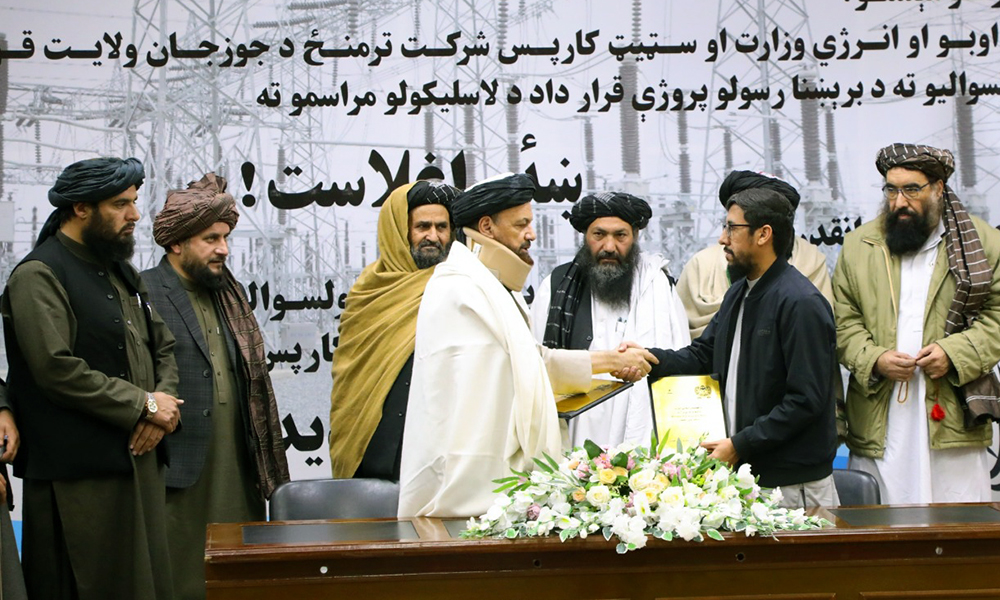
The Ministry of Energy and Water (MoEW) on Tuesday signed a major power supply project worth over 1.8 billion afghanis with domestic firm State Corps to provide electricity to Qush Tepa and Darzab districts in northern Jawzjan province.
The contract signing ceremony, held at the Government Information and Media Centre, was attended by Deputy Prime Minister for Economic Affairs Mullah Abdul Ghani Baradar and senior government officials.
Mawlawi Abdul Rahman Rahmani, Director General of Renewable Energy at MoEW, said the $28.4 million project (equivalent to 1.886 billion afghanis) aims to ensure nearly all households in Qush Tepa and Darzab have access to electricity.
He explained that the project involves constructing an 85.4-kilometre transmission line from Shiberghan, the provincial capital, building substations, and establishing electricity distribution networks in both districts.
Alauddin Salim, representing State Corps, described the initiative as “crucial” and said it is expected to be completed within three years. He highlighted that domestic firms, like State Corps, are more committed than foreign companies to project delivery.
According to MoEW, the project will be funded through revenues from Afghanistan’s mines and will provide electricity to around 47,000 families. The ministry urged the company to ensure timely completion with high quality standards.
Latest News
Pakistani cleric condemns lifetime immunity for Army Chief as un-Islamic
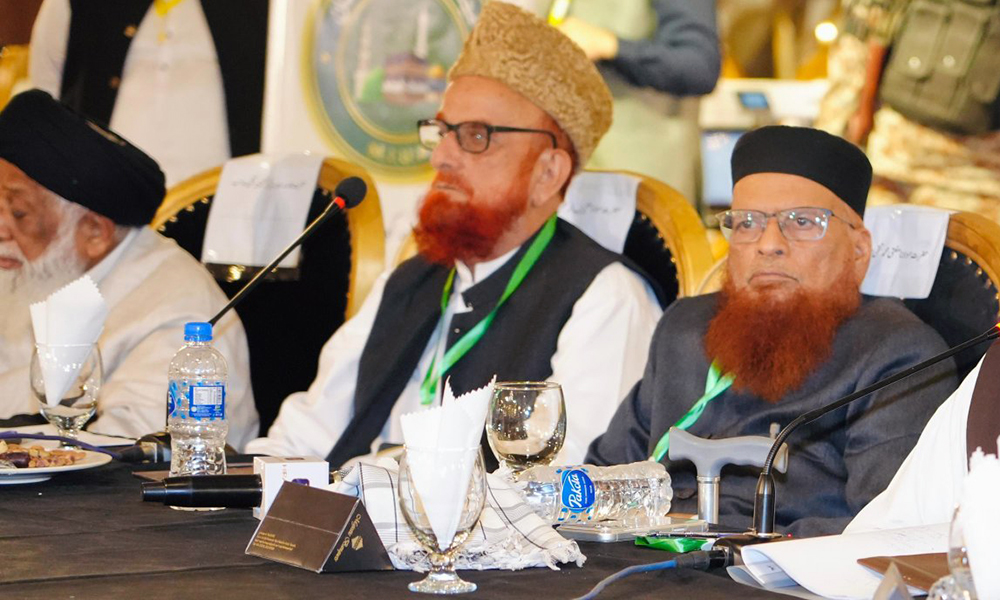
Prominent Pakistani religious scholar Mufti Taqi Usmani has strongly criticised moves to grant lifetime immunity to Pakistan’s Army Chief, General Asim Munir, describing such protection from judicial accountability as contrary to Islamic principles.
Speaking at a public gathering on Monday, Mufti Usmani said that Islam does not place any individual above the law, stressing that rulers, military leaders and ordinary citizens are equally accountable for their actions. He emphasised that justice and accountability form the foundation of an Islamic system, and that permanent immunity for powerful figures violates the spirit of Sharia.
The cleric warned that creating legal distinctions between state officials and the general public undermines public trust and fosters injustice within society. He urged state institutions to adhere to Islamic values when making political and military decisions, particularly those affecting governance and accountability.
Mufti Usmani’s remarks come amid growing debate in Pakistan over the role of the military in state affairs and the expanding authority granted to senior army officials. The issue has drawn heightened public and political attention in recent weeks, with critics arguing that excessive protections weaken democratic institutions and the rule of law.
Latest News
Fazal Ur Rehman says Pakistan’s ‘attacks’ on Afghanistan are unjustifiable
“If you justify attacks on Kabul by claiming your enemies are present there, then why is your response different when India targets its enemies inside Pakistan?” he said.
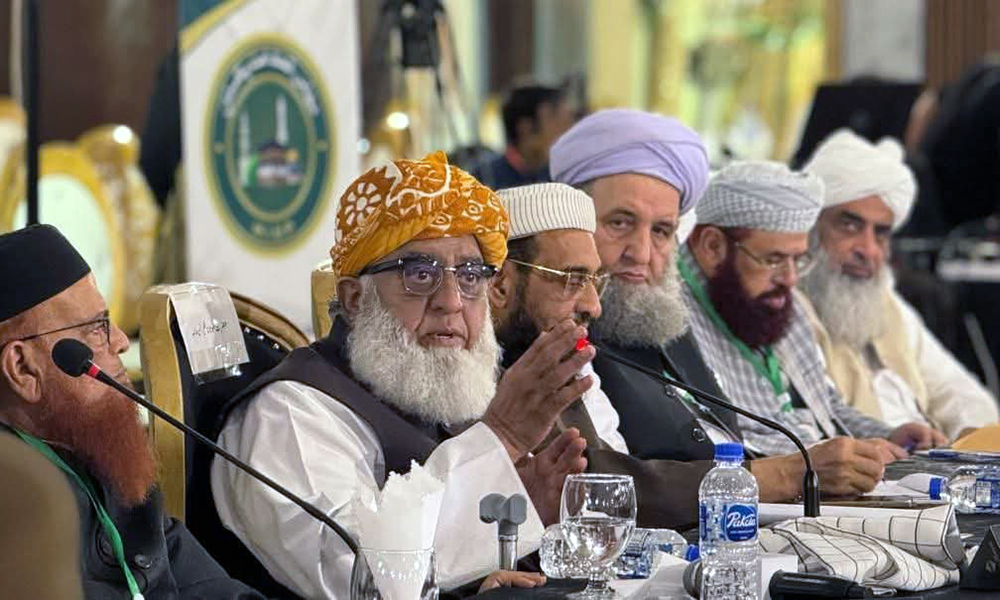
Senior Pakistani religious leader and politician Maulana Fazal Ur Rehman has condemned attacks on Afghanistan carried out under the pretext of targeting militant groups, calling such actions unjustifiable and counterproductive.
He urged both Kabul and Islamabad to resolve their disputes through dialogue and political engagement rather than military means.
Speaking at a gathering of Pakistani religious scholars titled “Pakistani Ummah Unity,” Fazal Ur Rehman, who heads the Jamiat Ulema-e-Islam (JUI-F) party, criticized Pakistan’s security approach toward Afghanistan.
Addressing Pakistan’s military leadership, he questioned the rationale behind cross-border actions, asking why attacks are justified against Afghanistan when similar logic is rejected in response to Indian strikes inside Pakistan.
“If you justify attacks on Kabul by claiming your enemies are present there, then why is your response different when India targets its enemies inside Pakistan?” he said.
Fazal Ur Rehman warned that continued tensions between Afghanistan and Pakistan serve the interests of neither country and risk further destabilizing the region.
He stressed that dialogue, mutual respect, and political understanding remain the only sustainable solutions to long-standing disputes between the two neighbors.
-

 Latest News2 days ago
Latest News2 days agoAfghanistan signs 30-year deal for marble mining in Daikundi
-

 Latest News4 days ago
Latest News4 days agoAfghan border forces prevent illegal entry of hundreds into Iran
-

 Latest News3 days ago
Latest News3 days agoPakistan summons Afghan diplomat over deadly attack in North Waziristan
-

 Latest News3 days ago
Latest News3 days agoAfghan health minister calls for medical cooperation between Kabul and New Delhi
-

 Latest News4 days ago
Latest News4 days agoJapan allocates nearly $20 million in humanitarian aid for Afghanistan
-

 Latest News3 days ago
Latest News3 days agoKarzai urges reopening of girls’ schools and universities for Afghanistan’s bright future
-
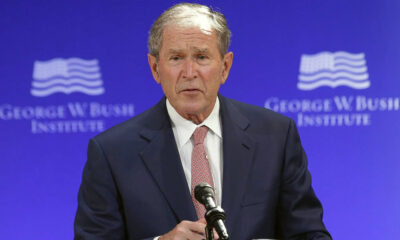
 Latest News2 days ago
Latest News2 days agoBush Institute criticizes Trump administration’s Afghan immigration freeze
-

 Health4 days ago
Health4 days agoIndia issues over 200 medical visas to Afghans in last four months


